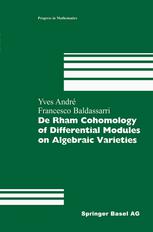

Most ebook files are in PDF format, so you can easily read them using various software such as Foxit Reader or directly on the Google Chrome browser.
Some ebook files are released by publishers in other formats such as .awz, .mobi, .epub, .fb2, etc. You may need to install specific software to read these formats on mobile/PC, such as Calibre.
Please read the tutorial at this link: https://ebookbell.com/faq
We offer FREE conversion to the popular formats you request; however, this may take some time. Therefore, right after payment, please email us, and we will try to provide the service as quickly as possible.
For some exceptional file formats or broken links (if any), please refrain from opening any disputes. Instead, email us first, and we will try to assist within a maximum of 6 hours.
EbookBell Team

4.7
96 reviewsThis is a study of algebraic differential modules in several variables, and of some of their relations with analytic differential modules. Let us explain its source. The idea of computing the cohomology of a manifold, in particular its Betti numbers, by means of differential forms goes back to E. Cartan and G. De Rham. In the case of a smooth complex algebraic variety X, there are three variants: i) using the De Rham complex of algebraic differential forms on X, ii) using the De Rham complex of holomorphic differential forms on the analytic an manifold X underlying X, iii) using the De Rham complex of Coo complex differential forms on the differ entiable manifold Xdlf underlying Xan. These variants tum out to be equivalent. Namely, one has canonical isomorphisms of hypercohomology: While the second isomorphism is a simple sheaf-theoretic consequence of the Poincare lemma, which identifies both vector spaces with the complex cohomology H (XtoP, C) of the topological space underlying X, the first isomorphism is a deeper result of A. Grothendieck, which shows in particular that the Betti numbers can be computed algebraically. This result has been generalized by P. Deligne to the case of nonconstant coeffi cients: for any algebraic vector bundle .M on X endowed with an integrable regular connection, one has canonical isomorphisms The notion of regular connection is a higher dimensional generalization of the classical notion of fuchsian differential equations (only regular singularities).